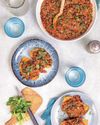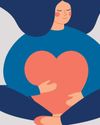
As a writer, words are my trade, but I find it difficult to describe the sense of devastation that swept over me the day I finally relinquished hope of ever becoming a mother. I had clung onto that hope for almost two decades, maintaining it through a decision not to bring children into an abusive relationship, an extended period of being single, followed by infertility and early menopause, and then withdrawing - at a very early stage - from an adoption process because of poor mental health. Even after all that, I still had hope, but one day when I was in my early 40s, I discovered that the hope - which had been both a lifeboat keeping me afloat and a prison preventing me from conceiving of the possibility of a happy future without children - had departed. I was faced with the sudden and unwelcome transition from a mother-in-waiting, a persona I had inhabited for most of my life, to a permanently childless woman.
My mental health fell off a cliff. Family and friends were puzzled when I tried to explain my emotions. It seemed strange to them that I could grieve for something that never existed, something as abstract as a never-conceived child. But, to me, my never-to-be-conceived children, and the life I thought I would lead as their mother, felt tangible, even though they had only ever existed in my hopes and dreams. I felt very alone - although, statistically speaking, I wasn't. The Office for National Statistics reports that around 18 per cent of women born in the same year as me (1971) remained childless at the age of 46 (deemed by the ONS to be the end of their child-bearing years). Objectively, I have never thought that women need to have children to be fulfilled, quite the opposite. There are numerous incredible childless (not by choice) and childfree (by choice) women living happy, purposeful lives to which many, including me, would aspire. But knowing that truth didn't seem to help.
Diese Geschichte stammt aus der October 2023-Ausgabe von Psychologies UK.
Starten Sie Ihre 7-tägige kostenlose Testversion von Magzter GOLD, um auf Tausende kuratierte Premium-Storys sowie über 8.000 Zeitschriften und Zeitungen zuzugreifen.
Bereits Abonnent ? Anmelden
Diese Geschichte stammt aus der October 2023-Ausgabe von Psychologies UK.
Starten Sie Ihre 7-tägige kostenlose Testversion von Magzter GOLD, um auf Tausende kuratierte Premium-Storys sowie über 8.000 Zeitschriften und Zeitungen zuzugreifen.
Bereits Abonnent? Anmelden

Why Are We So Sensitive About Being Sensitive? - Feeling empathy, energy and emotion keenly is not a failing - it can be your strength and your superpower, discovers Yasmina Floyer
All of us are sensitive - it is the very nature of being human. However, as with most behavioural characteristics, it exists on a scale. Jenn Granneman, founder of the world's largest community for introverts and co-author, along with Andre Sólo, of Sensitive (Penguin, £10.99), tells me about the characteristics of someone who is highly sensitive: 'Simply put, if you're a highly sensitive person, your body and mind respond more to the world around you. You respond more to heartbreak, pain, and loss - but you also respond more to beauty, new ideas, and joy. You're more affected by everything around you, but you also draw more from these experiences.

Try a Little Kindfulness - Make kindness a conscious practice and infuse your life with everyday abundance, writes Dr David Hamilton
The more we care about others, the more we realise that most people are just like us - trying to figure things out and hoping for a good day. It's easier to fear what you don't know, but once you get to know people, the world seems a lot smaller and cosier. So next time you're tempted to scroll past someone's problem, dismiss someone's feelings, or just be in your own little bubble, remember: the world's a better place when we all give a little f*ck. Let's sprinkle that stuff everywhere like it's magical kindness glitter!

There's No Excuse to Slow Down! - Presenter, podcaster and author Gabby Logan talks to Psychologies about health, happiness, and overcoming hurdles in midlife...
Presenter, podcaster and author Gabby Logan talks to Psychologies about health, happiness, and overcoming hurdles in midlife...When TV presenter Gabby Logan started to experience brain fog in her late 40s, struggling to recall the correct word or name on live TV, she initially put it down to tiredness. 'I couldn't quite get that name or articulate in the way I had previously been able to, so I was concerned, but it coincided with lockdown and not doing any telly for a while. I remember feeling quite nervous going back to live TV.' But the former international gymnast soon realised that it was a symptom of perimenopause and promptly went onto HRT, which she says has balanced her hormones.

Kindle your creativity
Increase your sense of connection and support your self-expression, urges Caroline Butterwick

Fast and filling!
Join the high-protein revolution and eat better everyday, with these full-of-flavour recipes from nutritionist Scott Baptie's new cookbook

What's your optimum?
Eating well can cure what ails us, so why is it so hard? Anna Blewett discovers the secrets to a more resolved relationship with food...

"FRIENDSHIP DELIVERED SO MUCH OF WHAT ROMANTIC LOVE HAD PROMISED"
Author Marianne Power talks to Psychologies about self-love and the sisterhood...

Summer break or make!
Hello, lovers! September is here, and the lazy holiday season is behind us. And for many-me included - now feels like the perfect opportunity for a personal kick up the backside, and to embark on a relationship reset. In my work, it's typically women who take the first steps accessing couples' help, but recently (and encouragingly) I've noticed an uptick in men reaching out to get relationship advice and wanting to put the work in.

Time to spread their wings
As the seasons shift and shudder, threatening rhythm and routine, Heidi Scrimgeour embraces September in all its bittersweetness...

Big wild world
Caro Giles fills up her cup with summer colour and awaits autumn wonder...